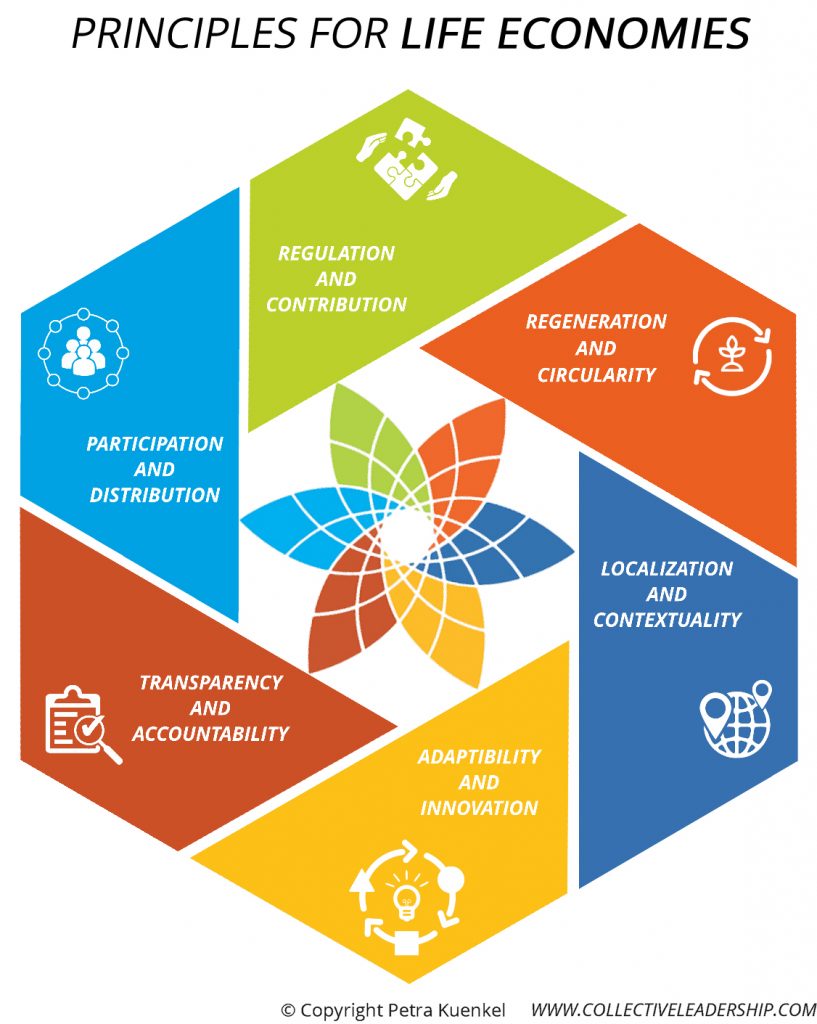12 October 2021 – Life on our planet has brought about a strange species, loving and longing to be alive, yet equipped with the capacity to destroy each other and diminish the life support system. Yet, this strange species has so many other capacities – caring for life, its fellow human beings and the wealth of natural beauty.
Could we rearrange our economic system in a way that it stops extracting life from the planet and instead regenerates and fosters our life support systems?
At a global scale, the COVID 19 pandemic is far from over, we experience forest fires of frightening magnitude, floods and storms scare many people to evacuate their homes. Not only young people say that time is running out, the latest IPCC report paints a depressing picture of our collective future and many scientists have been warning of “Hothouse Earth” scenarios since years. The Club of Rome’s famous report “The Limits to Growth” has been acclaimed and ridiculed at the same time – the fate of many people with serious foresight. But the Kassandras and visionaries are not alone anymore. A recent survey of the Global Commons Alliance shows that overall, 83% of global respondents are ready to become planetary stewards that safe the global commons. It is a lesson in humility that people in so-called developing economies are more prepared to protect nature and climate, e.g. Indonesia (95%), South Africa (94%), China (93%), than those in so-called advanced economies, e.g. Japan (61%), Germany (70%), and the United States (74%).
Can we, together, dismantle the destructive elements of our economies, and rebuild those that take us into the future?
This requires three fundamental reorientations:
- Moving from seeing the economy as dynamic market-driven process that requires little steering to ensuring economic activities serve Life, and subsequently people on this planet: The last 10 years have seen the rise of many new economic approaches from doughnut economics to mission economies, from regenerative economies to common good economies, from wellbeing economy to circular economy. Pioneering ideas are there, practices are far from mainstream, integration is still outstanding, but the pressure to fundamentally change the purpose of economies can’t be escaped. People’s and planetary health require strong and trusted governments, governance of the commons and reliable political participation.
- Moving from mindsets of extraction to mindsets of contribution: A new narrative is emerging around the global commons. What actually belongs to all of us (water, air, ecosystems, natural resources, etc.) should not be appropriated by a few for their own gain. We know this has happened for centuries, but a turnaround is possible and already beginning. Indications for this are the demands for establishing ecocide as a crime against humanity; the emergence of the living systems approaches as guidance for economies, and increasing attention how to actually govern the commons. The transformation of our economic system needs to center around the commons as life support system.
- Moving from the ego-centeredness of a proclaimed homo economicus to an attitude of collective stewardship: Not doing harm and following legal obligations is no longer enough, not for corporations, not for governments and not for citizens. Instead, the new orientation asks for how economic activities can be embedded in societies and the natural environment in a way that fosters the vitality of small and large systems. With no exception. Stewarding such transformations will become our daily job. Locally or globally, a planetary view of our daily actions and long-term strategies will become the norm.
All manifestations of economics between capitalism and communism so far had destructive elements, because the link between economic systems, human wellbeing and ecological impact remained unquestioned, ignored or at least insufficiently considered. The growth focus of the current economic framework at the expense of nature’s integrity and social cohesion is based on centuries of natural and human resource exploitation, culminating in the broad global dissemination of the neoliberal narrative that drives governments, economic progress metrics, and corporations.
Shifting this global operating system is not an easy task, yet it needs to happen much faster than most realize.
For the exponential acceleration we need there is a lot to learn from the innovative transitions that are already taking place at the fringe of the mainstream systems: responsible value chains, circular strategies, sharing economies, value-oriented banking, regenerative communities, or decentralized renewables, among many others. The modification and remodeling of our economic system has already begun.
What runs through the conceptualization and practice all of these different approaches for a new economy are themes that focus on social and ecological vitality. The future needs a global economic architecture that focuses on the conditions for life on our planet and has plural opportunities for implementation. At the core, such Life Economies consider individual and collective well-being together, as much as the interplay between people and nature. The core task for the future, then, is to recognize the conditions for interwoven social, economic, and ecological patterns that enhance system aliveness so that vitality or wellbeing is not a nice to have feature of the wealthy, but a new North star or Southern Cross – the purpose of economics. A lot has been researched and explored about principles that can guide such life economies. The underlying commonalities are striking: beneath the variety of proposals, reflections and practices can be captured in six guiding principles for life economies that can be scaled to shift the entire system.

Six guiding principles for life economies can be scaled to shift the entire system.
- Regeneration and circularity: Production and consumption cycles are socially embedded and have net-zero negative impact or regenerate life-support systems. This carries through all products and value chains, but also applies to services. Ecosystems are cherished, social systems cultivated.
- Localization and contextuality: Economic activities are contextually adapted, locally negotiated and strengthen regional cycles. Globalization and regional cycles are appropriately balanced. Economies are responsive to cultural value systems.
- Adaptability and innovation: Learning mechanisms foster life-enhancing technological and social innovation. Such cross-institutional learning takes place localized as well as globally. Governments and corporations invest in life-enhancing innovations.
- Transparency and Accountability: Reporting mechanisms and metrics create awareness of and track systems’ vitality. Societal progress indicators include a variety of aspects that measure social and environmental wellbeing. Trust reduces the transaction costs of societies.
- Participation and distribution: Governance and distributive measures guide wellbeing for all and ensure gender and social equity. Political participation and economic participation go hand in hand. Markets are guided, societal resource allocations further equality.
- Regulation and contribution: Voluntary and obligatory agreements (including resource allocations) safeguard commons and contribute to the vitality of social and ecological life-support systems. Business and constitutional laws reflect the importance of everybody’s responsibility for the future.
Hopefully, not everybody needs to travel into space like Amazon’s CEO Bezos did to realize that we need to take care of our fragile planet, because it is the only home we have so far. As the Global Commons Alliance survey shows many people have understood that this immensely beautiful, yet tiny fragile planet, has a delicate life support system that we need to take care of. Very practically Life economies can become the strategic driver of an attitude of care and contribution. Scaling these practices will shift the entire system towards a future we can reasonably hand over to the next generation.






